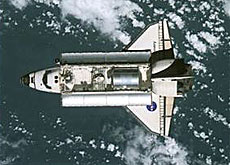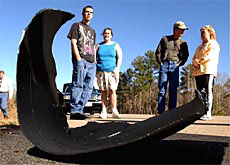Space institute boss says research will go on

Space research will continue, despite last week's shuttle disaster, according to the new head of Switzerland's International Space Science Institute (ISSI).
Roger-Maurice Bonnet told swissinfo that the loss of the United States’ Columbia space shuttle could cause delays in planned space missions, but would not curtail research.
He added that a consequence of the disaster was that international cooperation in space research had become more important than ever.
Bonnet – a French national – has just taken over as executive director of the ISSI, a European Space Agency-funded body promoting the exchange of scientific data among space agencies.
“I don’t think that an accident of this kind will stop exploration… The Challenger accident in 1986 did not stop the exploration of space – on the contrary, it expanded [it].”
Grounded
But Bonnet said the fact that the US shuttle fleet had been grounded would hold up some work in space and have an impact on the International Space Station and its Russian-US crew.
“This should affect temporarily the space station, but it will not affect it dramatically,” he told swissinfo.
The US shuttle Atlantis had been due to visit the station on March 1, taking with it a relief crew to replace the two American astronauts and one Russian cosmonaut who have been on the station since November. That mission is now unlikely to take place.
Bonnet said major problems would only arise if checks on all US spacecraft took more than just a few weeks.
“If there were years of delay… then the space station would have to be visited by the Russians.”
Rescue system
Bonnet said the Columbia disaster had made the US dependent for now on Russia, and better international cooperation was likely to develop.
“Today only the Russians have the ability to bring astronauts [into space] and carry them back to Earth.
“It is clear that, thanks to the cooperation with the Russians, who have this fairly old system of Progress and Soyuz cargo [craft] carrying both human beings and equipment, there is a rescue system. If this didn’t exist it would mean that the astronauts would be prisoners on the space station.”
Although experts are still trying to determine what exactly caused the Columbia to break up, Bonnet is certain that lack of funding for the US space shuttle programme was not a contributing factor.
“I have no indication that space money was lacking in the US,” he told swissinfo. “The US are spending $15 billion, which is the biggest budget ever… and I think other nations should be inspired by this example.
swissinfo, Morven McLean
Roger-Maurice Bonnet, the executive director of the International Space Science Institute in Bern says space research will continue despite the Columbia shuttle disaster.
He says cooperation between different countries’ space agencies is likely to intensify in future.
The future of the International Space Station is secure as long as the Americans are able to resume their space programme in the near future.

In compliance with the JTI standards
More: SWI swissinfo.ch certified by the Journalism Trust Initiative


You can find an overview of ongoing debates with our journalists here. Please join us!
If you want to start a conversation about a topic raised in this article or want to report factual errors, email us at english@swissinfo.ch.